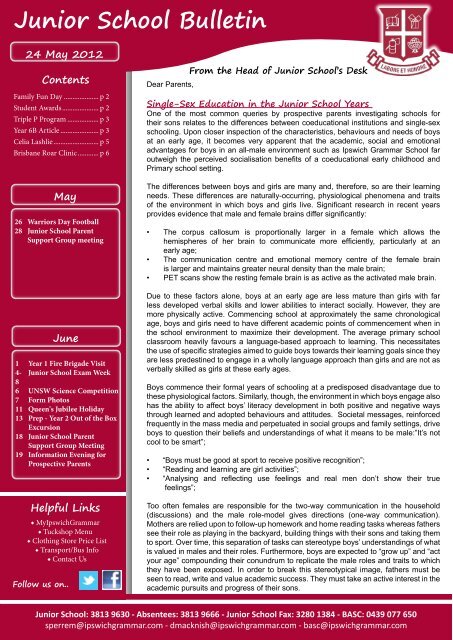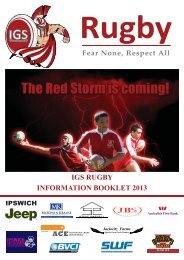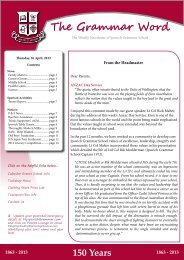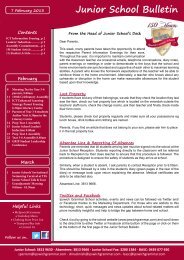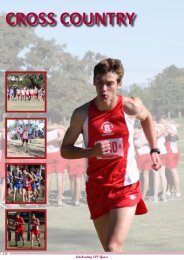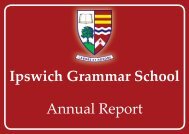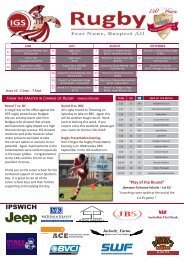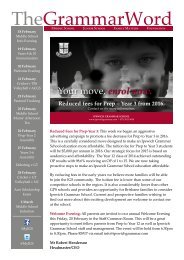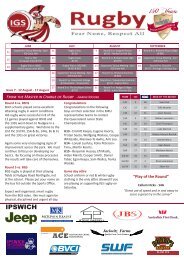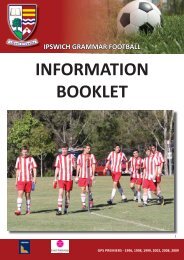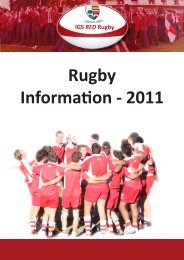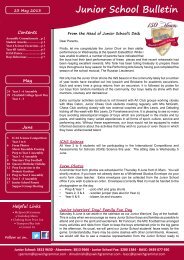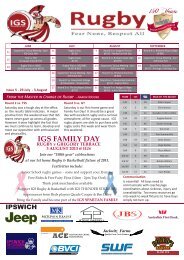24052012 - Ipswich Grammar School
24052012 - Ipswich Grammar School
24052012 - Ipswich Grammar School
You also want an ePaper? Increase the reach of your titles
YUMPU automatically turns print PDFs into web optimized ePapers that Google loves.
Junior <strong>School</strong> Bulletin<br />
24 May 2012<br />
Contents<br />
Family Fun Day..................... p 2<br />
Student Awards...................... p 2<br />
Triple P Program................... p 3<br />
Year 6B Article....................... p 3<br />
Celia Lashlie........................... p 5<br />
Brisbane Roar Clinic............. p 6<br />
Dear Parents,<br />
From the Head of Junior <strong>School</strong>’s Desk<br />
Single-Sex Education in the Junior <strong>School</strong> Years<br />
One of the most common queries by prospective parents investigating schools for<br />
their sons relates to the differences between coeducational institutions and single-sex<br />
schooling. Upon closer inspection of the characteristics, behaviours and needs of boys<br />
at an early age, it becomes very apparent that the academic, social and emotional<br />
advantages for boys in an all-male environment such as <strong>Ipswich</strong> <strong>Grammar</strong> <strong>School</strong> far<br />
outweigh the perceived socialisation benefits of a coeducational early childhood and<br />
Primary school setting.<br />
May<br />
26 Warriors Day Football<br />
28 Junior <strong>School</strong> Parent<br />
Support Group meeting<br />
The differences between boys and girls are many and, therefore, so are their learning<br />
needs. These differences are naturally-occurring, physiological phenomena and traits<br />
of the environment in which boys and girls live. Significant research in recent years<br />
provides evidence that male and female brains differ significantly:<br />
• The corpus callosum is proportionally larger in a female which allows the<br />
hemispheres of her brain to communicate more efficiently, particularly at an<br />
early age;<br />
• The communication centre and emotional memory centre of the female brain<br />
is larger and maintains greater neural density than the male brain;<br />
• PET scans show the resting female brain is as active as the activated male brain.<br />
June<br />
1 Year 1 Fire Brigade Visit<br />
4- Junior <strong>School</strong> Exam Week<br />
8<br />
6 UNSW Science Competition<br />
7 Form Photos<br />
11 Queen's Jubilee Holiday<br />
13 Prep - Year 2 Out of the Box<br />
Excursion<br />
18 Junior <strong>School</strong> Parent<br />
Support Group Meeting<br />
19 Information Evening for<br />
Prospective Parents<br />
Helpful Links<br />
◆ My<strong>Ipswich</strong><strong>Grammar</strong><br />
◆ Tuckshop Menu<br />
◆ Clothing Store Price List<br />
◆ Transport/Bus Info<br />
◆ Contact Us<br />
Follow us on..<br />
Due to these factors alone, boys at an early age are less mature than girls with far<br />
less developed verbal skills and lower abilities to interact socially. However, they are<br />
more physically active. Commencing school at approximately the same chronological<br />
age, boys and girls need to have different academic points of commencement when in<br />
the school environment to maximize their development. The average primary school<br />
classroom heavily favours a language-based approach to learning. This necessitates<br />
the use of specific strategies aimed to guide boys towards their learning goals since they<br />
are less predestined to engage in a wholly language approach than girls and are not as<br />
verbally skilled as girls at these early ages.<br />
Boys commence their formal years of schooling at a predisposed disadvantage due to<br />
these physiological factors. Similarly, though, the environment in which boys engage also<br />
has the ability to affect boys’ literacy development in both positive and negative ways<br />
through learned and adopted behaviours and attitudes. Societal messages, reinforced<br />
frequently in the mass media and perpetuated in social groups and family settings, drive<br />
boys to question their beliefs and understandings of what it means to be male:”It’s not<br />
cool to be smart”;<br />
• “Boys must be good at sport to receive positive recognition”;<br />
• “Reading and learning are girl activities”;<br />
• “Analysing and reflecting use feelings and real men don’t show their true<br />
feelings”;<br />
Too often females are responsible for the two-way communication in the household<br />
(discussions) and the male role-model gives directions (one-way communication).<br />
Mothers are relied upon to follow-up homework and home reading tasks whereas fathers<br />
see their role as playing in the backyard, building things with their sons and taking them<br />
to sport. Over time, this separation of tasks can stereotype boys’ understandings of what<br />
is valued in males and their roles. Furthermore, boys are expected to “grow up” and “act<br />
your age” compounding their conundrum to replicate the male roles and traits to which<br />
they have been exposed. In order to break this stereotypical image, fathers must be<br />
seen to read, write and value academic success. They must take an active interest in the<br />
academic pursuits and progress of their sons.<br />
Junior <strong>School</strong>: 3813 9630 - Absentees: 3813 9666 - Junior <strong>School</strong> Fax: 3280 1384 - BASC: 0439 077 650<br />
sperrem@ipswichgrammar.com - dmacknish@ipswichgrammar.com - basc@ipswichgrammar.com
For centuries, society has expressed the expectation that true males are dominant over females. Where does this leave boys<br />
when they enter the classroom with an automatic gap in literary exposure, literacy skills and the physiological wherewithal to<br />
make the necessary gains to match the girls academically? Fail to achieve better than the girls and these boys, having been<br />
influenced by centuries of societal expectations, can lose confidence and feel that they are “less of a man”. Saving face, refusing<br />
to try hard, choosing failure rather than becoming a failure... these all are options taken by boys in coeducational classrooms<br />
around Australia. Boys’ schools remove this factor immediately. Comparatively, and strangely enough, boys thrive on competition<br />
with each other and seek to outdo each other. This can be a decided advantage when their competitive natures are used to<br />
assist their engagement in tasks rather than to isolate them due to the previously examined “fear of losing face” in front of the<br />
girls when in coeducational settings.<br />
Boys are inherently physical beings. Teaching and learning experiences must cater for boys’ needs to move, use all of their senses,<br />
particularly that of touch, and to share their findings and discoveries verbally. At <strong>Ipswich</strong> <strong>Grammar</strong> <strong>School</strong>, boys are exposed<br />
deliberately to a wide variety of teaching strategies ranging from sitting at desks and listening and interacting to dramatic acting<br />
out, modelling and creative investigations. While many of the Junior <strong>School</strong> boys learn best when physically interacting with<br />
their subject matter (eg modelling, hands-on activities), they still must have experience with the more abstract, less interactive<br />
methods in order to enable them to deal appropriately with them when their learning structures and parameters change as<br />
they grow older. However, boys engage more with their learning when they are able to “do” the investigations, “discover” the<br />
knowledge, move around and use the physicality of their surrounding and the movement of their bodies to stimulate both the left<br />
and right hemispheres of their brains. Hands-on activities and physical activity assist boys to thrive in their learning. Similarly,<br />
boys like to own their learning, interacting more when there has been an element of choice incorporated within the context.<br />
Factors most influencing boys’ engagement with their learning include:<br />
• Connection with boys’ personal interests;<br />
• Choice;<br />
• Negotiation of elements of outcomes;<br />
• Learning activities which utilise physical movement and construction;<br />
• Appropriate humour;<br />
• Individual interest from teachers and role models;<br />
• Positive praise and reinforcement;<br />
• Talking with boys instead of lecturing at them.<br />
Boys require boundaries. Their sense of social justice is highly developed and they like to be clear about the expectations of<br />
behaviour. This clear structure and understanding enables them to accept consequences should they stray beyond the classroom<br />
expectations. However, they must be given opportunities to recognise the reasons for these rules to enable them to adopt these<br />
rules wholeheartedly.<br />
Finally, with the core needs of boys addressed in a safe and nurturing, all-male environment in which occasional failure is feted<br />
as a necessary learning tool, the boys of <strong>Ipswich</strong> <strong>Grammar</strong> <strong>School</strong> are able to thrive and develop their understandings to meet<br />
their potential. This surpasses any perceived minor physiological or socially-derived deficits which could occur if a boy interacted<br />
solely within the one all-male community. However, the boys of <strong>Ipswich</strong> <strong>Grammar</strong> <strong>School</strong> are involved in many family-based<br />
activities which broaden their experiences to a host of different communities during which it is plainly obvious that the all-male<br />
educational environment is just one of the many social settings in which they interact, thus counteracting any possible arguments<br />
in favour of coeducational schooling above the aforementioned benefits of single-sex educational institutions.<br />
A growing body of research is showing what most parents of boys already know - that boys need the right kind of environment to<br />
learn and develop to their full potential. Pastoral care that builds self-esteem, classroom activities that teach literacy, and learning<br />
by seeing and doing, all boost learning outcomes for boys”<br />
(Biddulph, 1997; Hawkes, 2001; Pollach, 1999 & 2000; Rowe, 2001).<br />
Junior Warriors’ Day/ Family Fun Day<br />
Saturday 26 May is set aside in the calendar as our Junior Warriors’ Day at the football. This is a day when we encourage as<br />
many Junior <strong>School</strong> boys and families as possible to attend and join in the spirit and excitement. Mr Fancourt, the MIC Football<br />
has arranged many activities and rides from 10am to keep the boys entertained prior to the big game in the afternoon. As usual,<br />
we will paint our Junior <strong>School</strong> students' faces ready for the game. Understandably, there may be some clashes with other<br />
commitments. However, we would still like to see a massive representation from the Junior <strong>School</strong> ready to support the First XI<br />
at Brassall. Come for the entire time or just for a bit. Please see attached flyer.<br />
Sincerely,<br />
David Macknish<br />
Head of Junior <strong>School</strong><br />
Upcoming Assemblies<br />
Fri 25 May - Yr 3-6 Awards Assembly (8.40am in Literacy Centre)<br />
Mon 28 May - Yr 4-12 Assembly (9.15am in Auditorium)<br />
Fri 1 June - No Assembly<br />
Junior <strong>School</strong>: 3813 9630 - Absentees: 3813 9666 - Junior <strong>School</strong> Fax: 3280 1384 - BASC: 0439 077 650<br />
sperrem@ipswichgrammar.com - dmacknish@ipswichgrammar.com - basc@ipswichgrammar.com
Student Awards<br />
Jack Fanshawe - consistent and outstanding behaviour and work ethic in class<br />
Brandon Beckett - presenting informative poster about bushfires<br />
Daniel Sellars - terrific work in Maths groups this week-a big effort to read and solve problems independently<br />
Baxta Dickson - working very well in all group tasks this week!<br />
Macauley Rapmund - a sensational effort to improve his writing this term. Keep up the great work<br />
Austin Trevanion - using a wide vocabulary to enhance his sentence construction. I enjoy reading your writing<br />
Matthew Dresselhaus - working very well to solve 3 and 4-digit addition and subtraction operations<br />
Timothy Fitzgerald - working consistently well in all areas – you are a reliable member of 3C<br />
500 reading award - Kadec MacKinney, Ryan Donnelly<br />
1000 reading award - Jack Charman, Oliver Watson, Ryan Wakista, Macauley Rapmund, Jack Williams, Lachlan Hood<br />
2000 reading award - Lushen Moodley<br />
3000 reading award - Brian Wakista<br />
7000 reading award - Oshi Edirisinghe<br />
Leadership award - William Macknish, Cale Lewis, Andrew Cook, Mackenzie O’Donnell, James Yates, Harry Dobson,<br />
William Kraschnefski, Alex Dobson, Theo Parrott, Ella Lewis<br />
Does your child suffer asthma or eczema?<br />
Every day thousands of Australian children suffer the effects of asthma and eczema, and families struggle<br />
with illness management and children’s behavioural and emotional adjustment.<br />
Positive Parenting for Healthy Living is an adaptation of the successful Triple P - Positive Parenting Program, offering practical<br />
ideas and support for parents of children suffering asthma or eczema. This innovative group program is designed to help parents<br />
manage their child’s illness, assist children in coping with their illness and emotions, and prevent and manage difficult child<br />
behaviour.<br />
Over the next few months and for a limited time only, parents of 3-10 year old children suffering asthma or eczema are able<br />
to access Positive Parenting for Healthy Living Triple P free of charge as part of a University of Queensland research project.<br />
Contact Amy Mitchell on (07) 3365 7305 or email healthyliving@uq.edu.au, or visit www.exp.psy.uq.edu.au/healthyliving for more<br />
information.<br />
Scientific Investigations with Year 6B<br />
Year Six have been investigating the world of micro-organisms<br />
as part of their Science studies.<br />
Micro-organisms are tiny one-celled organisms, viruses, fungi<br />
and bacteria which are found everywhere in the world. They are<br />
found in all living things, plants and animals. There are more<br />
micro-organisms on and inside your body than there are cells<br />
that make up your entire body.<br />
Last week, the students of 6B investigated yeast (a type of fungi) by participating in a series of experiments. The aim of the<br />
experiment was to find out what happens when combinations of yeast, sugar and water are mixed in a bottle. Scientific teams<br />
were determined with each group member fulfilling roles<br />
such as team director, speaker and manager throughout the<br />
experiment.<br />
Observations by all groups reported that one of the four bottles<br />
in particular, with the combination of water + yeast + sugar, had<br />
the greatest reaction by inflating a rubber balloon to a greater<br />
diameter. A before and after-shot can be seen below.<br />
The boys of 6B were asked to make some conclusions and<br />
anecdote their learning from this experiment on yeast. Some responses were as follows;<br />
When yeast, sugar and water combine in a bottle they will be able to pop a balloon! (Connor Street, 6B) I’ve learnt that yeast<br />
can only survive in a warm temperature and not when cold or boiling hot. Also, sugar helps yeast grow and yeast grows rapidly.<br />
(Bayley George, 6B) I learnt that if yeast is too hot it will die and if it is too cold it will die. (Sancak Durmaz, 6B) I have concluded<br />
that yeast grows faster with sugar. It also needs water to survive and grow, just like us! Also, the yeast feeds on the sugar,<br />
therefore multiplying the cells. (Isaac Irons, 6B)<br />
Junior <strong>School</strong>: 3813 9630 - Absentees: 3813 9666 - Junior <strong>School</strong> Fax: 3280 1384 - BASC: 0439 077 650<br />
sperrem@ipswichgrammar.com - dmacknish@ipswichgrammar.com - basc@ipswichgrammar.com
FAMILY FUN DAY<br />
Roary the mascot<br />
Brisbane Roar Rapid Fire Field<br />
Jumping castles<br />
Supa slide<br />
Mechanical surfboard<br />
Supa swings<br />
Free fairy floss<br />
Free snow cones<br />
Free face painting<br />
Proudly sprte by<br />
Saturday 26 May - 10:00 am to 2:00 pm - Brassall Sporting Fields, Pearse Drive<br />
BRISBANE ROAR<br />
HOLIDAY CLINIC<br />
BRISBANE ROAR HOLIDAY CLINIC<br />
Thursday 28 June - 9.00am to 2.00pm<br />
<strong>Ipswich</strong> <strong>Grammar</strong> <strong>School</strong> Campus<br />
Age Group: 6 - 12 yrs<br />
Cost: $50 per child<br />
See registration form for more details<br />
IPSWICH GRAMMAR SCHOOL
Wednesday 22 August<br />
6:30 pm<br />
IGS Auditorium<br />
$10 per person<br />
Contact Administraon on 3813 9600 or email info@ipswichgrammar.com to reserve your ckets.<br />
Payment can be made at the door on the night.<br />
Junior <strong>School</strong>: 3813 9630 - Absentees: 3813 9666 - Junior <strong>School</strong> Fax: 3280 1384 - BASC: 0439 077 650<br />
sperrem@ipswichgrammar.com - dmacknish@ipswichgrammar.com - basc@ipswichgrammar.com
BRISBANE ROAR<br />
H LIDAY CLINIC<br />
Join us for games, drills and holiday football<br />
fun with Brisbane Roar and your mates.<br />
Get in early to register for the Brisbane Roar<br />
Holiday Clinic where you will learn lots about<br />
the game and develop your skills even more<br />
with the Roar while playing the best game<br />
in the world! Football!<br />
The Holiday Clinic Includes:<br />
5 Hours of Football & Roar Inflatable Fields<br />
Pauls Supporters Pack<br />
Venue:<br />
IPSWICH BOYS GRAMMAR ROAR CLINIC<br />
DARLING STREET<br />
IPSWICH<br />
Dates:<br />
Times:<br />
Age:<br />
Cost:<br />
Thursday June 28th<br />
9am - 2pm on Thursday<br />
6 - 12 Years<br />
$50 Per Child<br />
Don’t forget to bring a snack,<br />
waterbottle, sunscreen, a hat, and<br />
running shoes or football boots!<br />
For enquiries please contact Rozanne Burley<br />
on 0448 136 986 or rap@brisbaneroar.com.au<br />
Registration for:<br />
IPSWICH BOYS GRAMMAR ROAR CLINIC<br />
Your child’s details<br />
Full Name:<br />
Date of Birth:<br />
Age:<br />
Home Phone:<br />
Mobile:<br />
Email:<br />
Address:<br />
Medical Condition:<br />
<strong>School</strong> Grade:<br />
Postcode:<br />
Emergency Contact Details<br />
Name<br />
Number<br />
RETURN COMPLETED FORMS TO BRFC<br />
Fax: 07 3009 0516<br />
Email: rap@brisbaneroar.com.au<br />
Post: Brisbane Roar FC, Locked Bag 10<br />
Kelvin Grove BC 4059<br />
Payment details<br />
Credit Card<br />
Mastercard<br />
Card Number<br />
Visa<br />
/ / /<br />
Expiry Date /<br />
Signature<br />
Credit Card payments will incur a 2% surcharge.<br />
Cheque/Money Order<br />
Please make payable to Brisbane Roar FC<br />
and attach to this registration form.<br />
Cheque No.<br />
Amount<br />
Parent/Guardian Disclaimer<br />
I certify that my child enrolled hereon is in excellent health and may<br />
participate in strenuous physical activities including soccer. I agree to<br />
defend and hold Brisbane Roar FC, its servants, agents and/or employees<br />
and contractors harmless from any and all claims for injuries that may<br />
be sustained by my child during his or her participation in the camp.<br />
Permission is hereby granted to Brisbane Roar FC to use pictures of the<br />
participants in any promotional materials. Permission is granted for my<br />
child to receive emergency medical treatment, if needed, and I certify<br />
that there are no limits to my child’s participation except as stated in<br />
writing and included with this application.<br />
Acceptance<br />
Parent/Guardian Name (please print):<br />
Signature<br />
Date


